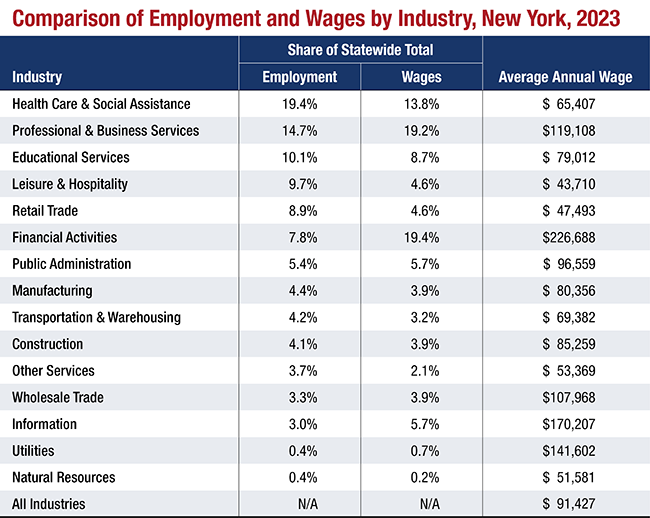OSC Issues Report on Where New Yorkers Work
Per the notice below, the Office of the New York State Comptroller (OSC) has issued a report on where New Yorkers work.
DiNapoli Report Highlights Where New Yorkers Work
A report by State Comptroller Thomas P. DiNapoli shows the state’s employment picture has changed in significant ways since 2000 with the health care and social assistance industries increasing their share of total employment as manufacturing and financial activities shrank. Employment in health care and social assistance had the greatest increase in jobs since 2019, with the sector now comprising nearly one in five jobs statewide. This sector was also the top employer in 2023 in every region of New York except the Southern Tier, and had an average annual wage of $65,407, 28.5% below the state average of $91,427.
“New York was hit early and hard by the pandemic, with every industry in every region losing jobs,” DiNapoli said. “It took the state nearly two years longer than the nation to regain those jobs and some regions are still struggling. This report focuses on how employment has changed across the state, and provides data to assist policymakers in examining job and workforce development programs to help ensure quality employment opportunities for all New Yorkers.”
DiNapoli’s report found:
- While the nation fully recovered jobs lost by June 2022, New York did not recover until April 2024.
- In 2023, seven of the 15 industry sectors, including health care, had employment above 2019 levels; the remainder, particularly retail trade and leisure and hospitality industries, struggled to regain the jobs lost in 2020.
- Employment in financial activities, which pays average annual wages more than double the state average, dropped from 9% of all jobs in 2000 to 7.8% in 2023. Similarly, employment in manufacturing, which comprised 8.8% of the total jobs in 2000, was over four percentage points lower in 2023.
- The average annual wage increased 21.3% from 2019, exceeding the Mid-Atlantic inflation rate of 17% for this period. While all industries experienced double digit growth in wages from 2019 to 2023, the strongest wage growth was in industries that have made the weakest employment recovery. Factors that could be influencing such gains are minimum wage increases, labor shortages or productivity gains.
- Approximately one in every nine workers (11.6%) earned the state minimum wage in 2022 (the latest data available), though rates were much higher in the leisure and hospitality and retail trade sectors, at 27.1% and 22.4%, respectively. Both ranked among the top industries for wage growth from 2019 to 2023. While the minimum wage changed little in New York City from 2019 to 2023, increasing primarily for home health care workers, its growth in the rest of the state was more significant.
- More than one in three jobs statewide were in four occupational groups: office and administrative support, sales and related occupations, healthcare support, and food preparation and related serving occupations. The median wages for these groups were less than the state median of $58,600 in 2023, potentially due to higher shares of employees who work part-time in those occupations.
- Home health and personal care aides was the single most dominant occupation in New York in 2023, with over 566,000 jobs (6% of all employment) – more than double that of the second ranked occupation, retail salespersons.
Regional findings include:
- Regional recovery in 2023 was varied with no region above 2019 levels. Only New York City, Long Island, and the Hudson Valley had employment above 2019 levels in August 2024. Three other regions – the Capital Region, Central New York, and Western New York – are nearing recovery, while the rest continued to lag.
- While more than 70% of state jobs were located in the three downstate regions (New York City, Long Island, and Hudson Valley) in 2023, the concentration of industries varied across regions. Almost two-thirds of financial activities jobs and just under 75% of information sector employment were in New York City. Upstate regions comprised over half of all manufacturing jobs and three-quarters of natural resources employment.
- In every region, leisure and hospitality, retail trade, and health care comprised over one-third of the total employment in 2023. The North Country and the Mohawk Valley, regions with over 43% of employment in these three sectors, were also among the top three regions for wage growth.
- At least one industry in every region continued to shed jobs after 2020; the majority of regions continued to lose jobs in the information and public administration sectors.


